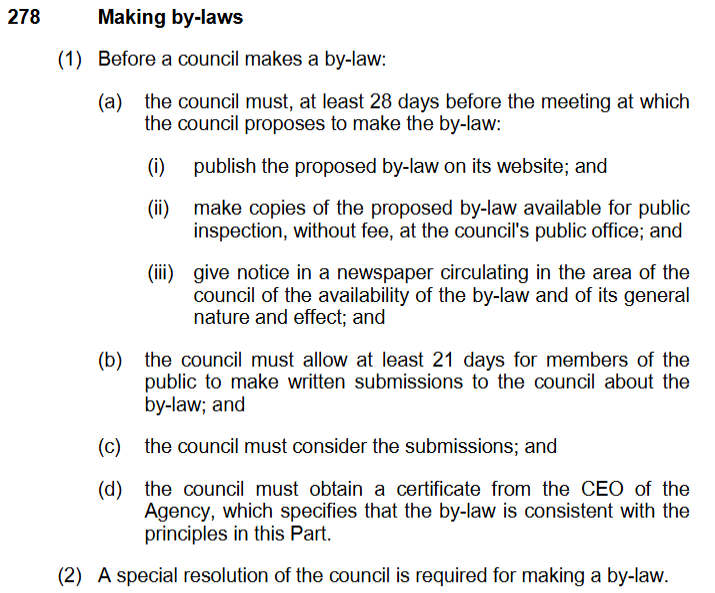By-laws respond to issues and community needs within a local government area. They are subordinate legislation of the NT Local Government Act 2019 and complement responsibilities and powers under state and federal law. Council By-laws apply to activities on Council land and should be fit for purpose, reflecting community standards, expectations, and Council operations.
Background
Council currently has By-laws relating to the control and management of dogs only (Litchfield Council (Dog Management) By-laws), gazetted in 2017 and manages removing abandoned vehicles and illegal parking issues under the Northern Territory Traffic Regulations 1999.
Council made the following resolution in February 2021:
THAT Council:
6. rescind Council decision 15/0175/02 of 19 November 2015 instructing the Acting Chief Executive Officer to begin negotiating with Parliamentary Counsel on the drafting of Meeting Procedures By-Laws for Litchfield Council; and
7. advise the Department of Local Government, Housing and Community Development that it does not wish to proceed with the development of Meeting Procedures By-laws and seek assistance for the development of Public Place By-laws.
CARRIED (3‐2)‐2021/150
In December 2021 Council endorsed drafting instructions (report can be seen here) for a range of new By-laws for activities conducted in public places in line with previous Council decisions to develop by-laws for signage, roadside vans or events on Council owned land. It was not until November 2023 that the NT Department of Local Government requested confirmation of these drafting instructions with a drafter from the Parliamentary Counsel becoming available to develop By-laws from these instructions. A first draft of these By-laws was provided to Council in mid-May 2024.
Since receiving the draft By-Laws, key staff have been working on the initial draft, communicating regularly with Parlimentary Counsel and developing supporting documentation and internal processes, liaising with external agencies and preparing public consultation. The new By-laws will be incorporated into the current Dog Management By-laws. There will be no changes to the current animal management component of the By-laws.
The proposed new By-laws will include;
- Advertising signs in public places – introduce a permit system to allow for outdoor advertising signage on Council land or Council road reserves.
- Stack and store goods in public places – introduce rules for storing goods on Council land, making it an offense to do so without proper authorisation.
- Camping on council land – introduce rules for illegal camping on Council land and Council road reserves, making it an offence to do so.
- Operating a roadside food van – introduce a permit system for operating a roadside food van on Council land or Council road reserves, making it now possible and legal to do so (with a permit).
- Unsafe and cluttered allotments – introduce rules to ensure properties are kept safe, clear of clutter, and free from conditions that may pose a risk to health or safety like fire hazards or pests.
- Erecting structures on Council land – introduce rules for constructing structures on Council land, making it an offence to do so without proper authorisation.
- Behaviour in a public library – introduce rules for behaviour in the public library and supervision of children. Library officers will be granted the ability to remove people from the library.
- Littering – introduce rules for littering or engaging in illegal dumping, making it an offence to do so.
- Obstructing use of public facilities – introduce rules for behaviour at public facilities and amenities, making it an offence to obstruct or intimidate another person from using the public facilities and amenities.
When making By-Laws, Council subject the Local Government Act 2019 as provided below;

Council is seeking feedback on:
ways the new by-laws may positively or negatively impact residents and businesses that Council hasn’t yet considered
how unintended negative impacts could be reduced or managed
opportunities through the introduction of permit systems allowing businesses to advertise or conduct business on council land and roadsides (i.e. mobile food vans and business signage).
